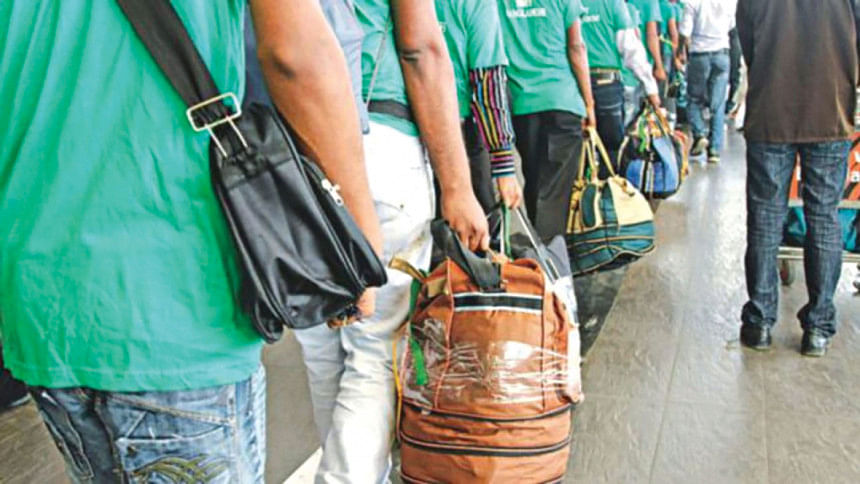A hostel of nightmares

The dream of a better life in Malaysia has turned into a nightmare for around 100 Bangladeshi migrant workers, each of whom had taken loans of around Tk 5 lakh to reach the country.
Once there, they were thrown into a squalid hostel in Sepang district in the southern part of the Malaysian state of Selangor.
Crammed together, 20-25 men share a single room, with limited access to even basic necessities like food. Their pleas for work and wages went unanswered, leaving them drowning in debt with no way out.
This crushing despair was only intensified by the sudden death of fellow worker Shafiqul Islam, who suffered a stroke on February 29.
Al-Amin (not his real name), 23, on March 20 told this correspondent, "Shafiqul and I were roommates. Each of us had borrowed large sums of money to come to Malaysia. However, upon our arrival, we quickly discovered that we had been deceived.
"Like the rest of us, he [Shafiqul] was constantly anxious. We are uncertain about how we will manage to repay the loans."
He claims they had only received a meagre 200 Malaysian Ringgit (Tk 5,000) for food in the past seven months. "It is an attempt to just provide us with the bare minimum so that we don't complain to the labour department."
Al-Amin added that around 300 workers arrived in Malaysia to work for Petrazehra Berhad in October. But none of them were given jobs, granted work permits, or had their passports returned.
Around 200 of them managed to leave the hostel to seek employment or stay with friends.
The 100 who remain at the hostel sleep on the floor, mostly eat rice and lentils, and occasionally can afford eggs. Many of them have been falling ill, with no access to proper healthcare, they said.
"My blood pressure is often high. When a few of us visited the doctor two weeks ago, he only checked our pressure and gave us some medications," said Al-Amin. He explained that the doctor could not do further check ups as they do not have passports or work permits.
He borrowed Tk 5 lakh for the job in Malaysia and took an additional Tk 60,000 from home to survive the past seven months.
Petrazehra Berhad, a Johor Baru-based Malaysian company, hired the Bangladeshi workers. As per the job contract, they were supposed to get RM 1,500 (Tk 37,500) as basic salary. The brokers who mediated even promised the workers they would earn Tk 60-70 thousand a month.
The Bangladesh High Commission in Malaysia wrote a letter to the expatriates' welfare ministry in February saying that 14 recruiting agencies got approvals for sending 1,500 workers for Petrazehra Berhad, and 725 of them travelled to Malaysia.
It requested the agencies not to send the remaining 775 workers to Malaysia until the 725 got jobs, implying they were yet to be employed.
According to the Bureau of Manpower Employment and Training, over four lakh Bangladeshis have gone to Malaysia since late 2022, when the Southeast Asian country reopened the labour market for Bangladesh after four years.
The Malaysian labour market was earlier restricted for Bangladeshis following allegations of corruption and irregularities against a syndicate of 10 recruiting agents.
In 2022, initially 25 Bangladeshi agencies were allowed to recruit workers. The number was later extended to 100.
Activists and researchers estimate that out of approximately 800,000 Bangladeshis in Malaysia, 100,000 to 200,000 workers remain jobless, unpaid and in debt.
Billal Khan (pseudonym), another migrant in the group, said, "Petrazehra agents warned us not to complain to authorities. They kept promising us work permits and jobs, but nothing has materialised yet."
He too had to manage Tk 5 lakh through loans and selling off his cattle and also borrow an additional Tk 70, 000 from relatives back home.
"Now, my family can't pay back the loans nor take new ones to help me survive."
Billal even secretly visited a friend half an hour away from the Sepang hostel in an attempt to gather some money. "I left the hostel despite the fear of being caught by the police, but I'm left with no other option."
Those who managed to flee the hostel remain undocumented.
Even if they find jobs somewhere else, they will be under constant fear of being arrested as foreign workers can only work in the companies that hire them.
"We had come here for a better life, but are now crying for help. None but Allah would understand what we are going through," said Billal.
About the Bangladeshi workers suffering in Malaysia, Foreign Minister Hasan Mahmud on Thursday said his ministry has already asked the Bangladesh High Commission there to discuss the issues with the Malaysian authorities.
"We've discussed the labour issues with the Malaysian High Commission [in Dhaka] as well. I have a plan to hold discussions in this regard at the foreign and labour ministry levels," he told The Daily Star during a briefing at the foreign ministry.
He, however, claimed the situation for the workers there right now is much better than what it was a year ago.

 For all latest news, follow The Daily Star's Google News channel.
For all latest news, follow The Daily Star's Google News channel. 









Comments